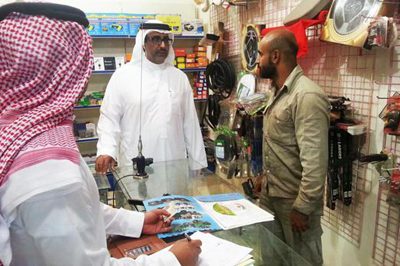Jeddah, Nov 12: The Labor Ministry’s ongoing inspections backed by security teams to check on expatriates’ legal work status, particularly those working in the industrial sector is causing much concern among those who are not in compliance with the Kingdom’s work and residency laws.
With the Labor Ministry having joined forces with security teams, illegal workers who could earlier slip through the many loopholes in the system are now finding it harder to do so.

Thousands of expatriates, mainly Asian workers are employed in workshops across the Kingdom doing mechanical jobs such as welding, carpentry, automobile repairs and fixing breakdowns in heavy earth-moving equipment. However, many are not working according to the profession listed on their iqamas with some not having taken advantage of the correction campaign, while others being unable to for various reasons.
A significant number also work in automobile workshops and in jobs of auto-electricians. In addition, a large number of expatriate workers who came to the Kingdom to work as domestic help are also engaged in operating welding workshops besides agricultural jobs in Taif, Hail, Qassim and other regions.
“Some of the workshops in Marad Al Sanaya on the Baha road in Taif are being closed because the employee’s work permit does not match his profession,” said an expatriate worker not wishing to be named. He said that it was technically impossible to amend his profession in the iqama because of the nature of his employer work records at the Ministry of Labor.
He added that a few workers were repairing cars near their homes but most car jobs need fully equipped workshops. He also said that many Pakistani workers were working as water pump mechanics but the intensified inspection campaigns were affecting their jobs.
Meanwhile, Lt. Aati Al Qureshi of the Makkah regional Police said: “We have caught 326 expatriates in Taif for violating work and residency laws in the past two weeks.”
Al Ahsa in the Eastern Province is also constantly targeted by authorities where many workshops along the Riyadh road have shut down for similar reasons. The high cost of rectifying the professional status has forced several expatriates to close shop and return to their home countries, said sources in Al Ahsa.
According to the officials, “Some 79 workshops in Al Ahsa have been booked for violations.” They added that expatriates who were running these workshops are not only subject to fines but will face several problems when their current iqama expires.
In Jeddah, workshops located in Bani Malik and Bawadi districts have also been severely affected by the inspection campaigns which have resulted in an increase in the repair costs of vehicles and other services.
The joint inspection campaign by the authorities has also targeted Jeddah’s industrial area where officials have conducted massive raids in a month’s span.
In the latest raid, officials booked 320 violations against expatriate workers and their employers for breaking the law. “We will continue inspections in the Industrial area as part of the general inspection campaign,” said Hussain Al Ghamdi in the Ministry of Labor in Jeddah.





Comments
Add new comment